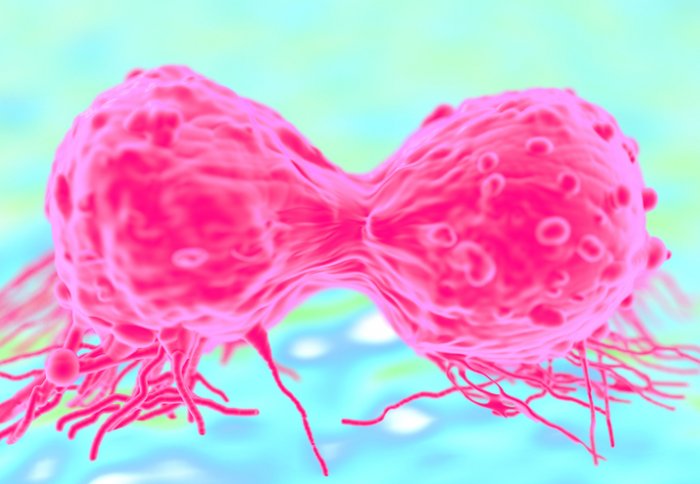Cholesterol-lowering statins could help tackle breast cancer
by Kate Wighton

Dividing breast cancer cell
A new study by researchers from Imperial College London suggests statins could help fight hard-to-treat cancers.
The research, published today in the journal Nature Communications, reveals that tumours rely heavily on cholesterol for growth. Cholesterol-lowering statins – which are currently prescribed to around 30 million people worldwide, can block this supply – causing it to ‘starve’ and die.
The team behind the research focused on oestrogen-receptor positive breast cancers. These make up over 70 per cent of all breast cancers, and are fuelled by the hormone oestrogen, which binds to the oestrogen receptor inside cancer cells where triggers growth.
These cancers are usually treated with surgery to remove the tumour, followed by a course of targeted chemotherapy.
However, many cancers eventually become resistant to these treatments – and so patients see their cancer return - although it is unknown why.
Earlier work has suggested women with breast cancer who take statins have fewer relapses, and so the team decided to examine cholesterol production in breast cancer cells.
By performing tests on cancer cells in the lab, and studying the activity of genes involve in cholesterol production, the team discovered cancer cells can increase their production of cholesterol, especially once they become resistant to chemotherapy. All cells in the body produce small amounts of cholesterol – as it is crucial to survival – but the study suggests drug resistant cancer cells turbo charge their cholesterol-making machinery.
"It’s like trying to stop a car by blocking the supply of gasoline, but the engine has already switched itself over to diesel."
– Dr Luca Magnani
Study Author
This cholesterol provides cancer cells with an alternate source of fuel, meaning they are no longer reliant on oestrogen to grow – and the cancer becomes resistant to the chemotherapy.
Using mouse models and three dimensional cell systems, the team showed statins may be able to target cholesterol production in drug-resistant cancer cells, and slow growth.
However, the scientists caution that simply taking a statin alongside normal cancer treatment would have no effect as not enough of the statin would reach the cancer cells.
But because the team identified genes associated with turbo-charged cholesterol production, they suggest doctors could one day test breast cancer patients for these genes. If the genes were found to be switched on, it could influence a doctor’s choice of chemotherapy, explains Dr Luca Magnani, the leading scientists of the study from Imperial’s Department of Surgery and Cancer.
“If a doctor sees from a patient’s genetic tests that their cancer cells have highly active cholesterol-making machinery, then they may chose Tamoxifen, since it binds to the estrogen receptor and stops the cell growing even in the presence of high cholesterol levels. There is no point in choosing the alternative treatment – aromatase inhibitors - which lowers the amount of oestrogen in the blood, as the cancer has already found an alternate source of fuel. It’s like trying to stop a car by blocking the supply of gasoline, but the engine has already switched itself over to diesel. However, if you use Tamoxifen, you’re jamming the engine altogether.”
He adds that human studies are now needed to confirm these findings.
Article text (excluding photos or graphics) © Imperial College London.
Photos and graphics subject to third party copyright used with permission or © Imperial College London.
Reporter
Kate Wighton
Communications Division